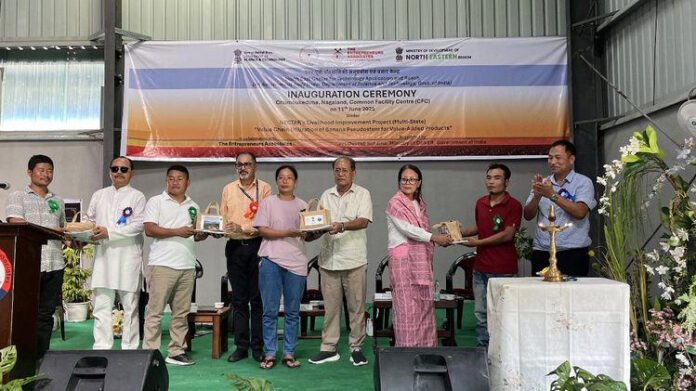The inauguration of a banana fibre extraction facility in Nagaland marks a significant shift toward sustainable rural development. The facility, established in Chümoukedima district, promises to create jobs, reduce waste, and empower communities by tapping into the often-overlooked banana plant byproduct—its fibre.
This initiative, launched by the North East Zone Cultural Centre (NEZCC) in collaboration with local agencies, is part of a broader mission to promote eco-friendly entrepreneurship and revive traditional livelihoods across the region.
Read More: ASHA Pay Hike Assam, Land Cleared Under Basundhara
Empowering Villages with Sustainable Income
The banana fibre extraction facility uses the pseudo-stem of banana plants, which farmers usually discard after harvesting. With the new processing unit, these stems now become valuable resources for producing natural fibre used in textiles, handicrafts, ropes, mats, and eco-friendly packaging.
Local women and youth will receive training in fibre extraction, weaving, and product design. This will open up avenues for micro-businesses and self-help groups, increasing household incomes.
The project also includes skill development workshops and tie-ups with marketing agencies to ensure sustainable product demand. This hands-on support helps transform banana cultivation into a multi-purpose agricultural venture.
Strengthening Nagaland’s Green Economy
The launch of the banana fibre extraction facility aligns with Nagaland’s ongoing efforts to build a green economy. Officials highlighted the environmental benefits of using agricultural waste to create biodegradable products.
Compared to synthetic materials, banana fibre is fully compostable, strong, and versatile. Its increasing demand in both domestic and international markets positions Nagaland as a potential hub for natural fibre production.
By embracing such eco-conscious industries, the state reduces plastic dependency and adds value to local farming. The move also strengthens indigenous craftsmanship, as the fibre blends well with traditional Naga weaving techniques.
Government Support and Community Impact
The facility was inaugurated in the presence of local leaders, entrepreneurs, and artisans. Government officials reaffirmed their commitment to supporting rural innovations. They emphasized that projects like these directly contribute to economic resilience in tribal and agrarian areas.
By focusing on locally available resources, the banana fibre extraction facility reduces production costs and transportation dependency. It also helps communities adopt low-carbon practices and promote circular economies.
With regular training sessions and supply-chain support, the facility is expected to become self-sustaining within the next year. Its success may also encourage replication in other banana-growing districts of Nagaland and neighboring states.
A Model for Rural Transformation
The facility’s opening reflects a shift in development strategies—from subsidy-based support to skill-based sustainability. It recognizes the potential of native knowledge and natural resources as key drivers of inclusive growth.
The banana fibre extraction facility is more than an industrial unit. It is a symbol of hope for farmers and artisans looking for stable income without leaving their villages. The project bridges modern technology and traditional skills, laying the groundwork for long-term prosperity.
Looking Ahead
As production begins, stakeholders are already planning expansion. They aim to connect local producers with national buyers, eco-conscious brands, and export markets.
With consistent support, the banana fibre extraction facility could place Nagaland on the map as a leader in sustainable fibre innovation. It not only uplifts rural families but also promotes India’s commitment to green entrepreneurship and indigenous enterprise.
Read More: President Murmu Assam Visit Postponed Again

